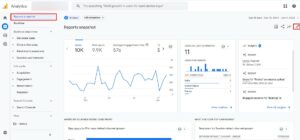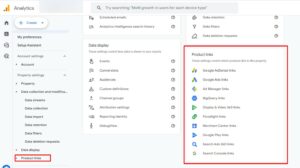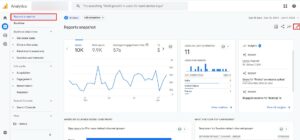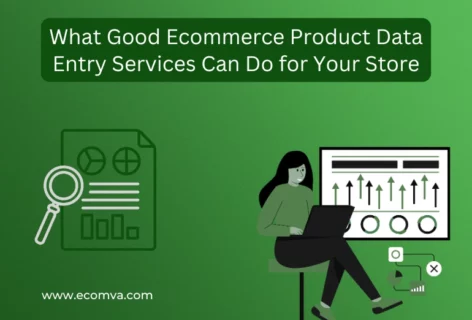Universal Analytics to GA4: A New Era for E-commerce Analytics
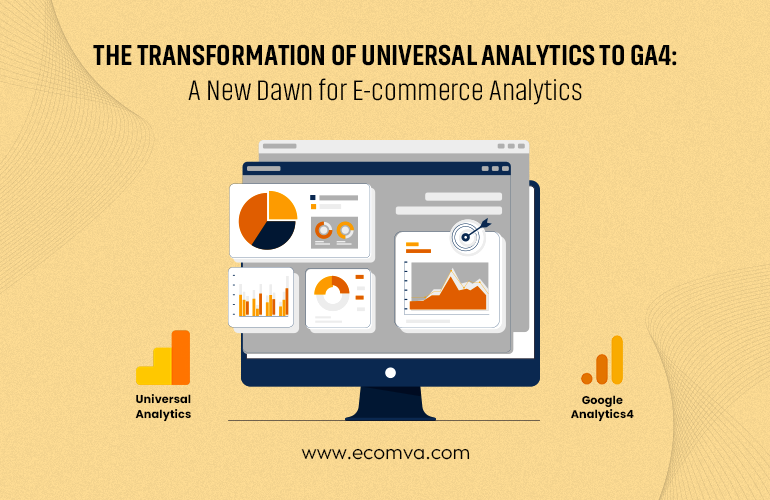
E-commerce has always been about tracking and maintaining records of visitors, buyers backed with purchasing power and more. E-commerce analytics have been a strong contributor for businesses to make guided strategies and decisions. Data is undoubtedly the pivotal part of the entire online marketing approach. That’s because it helps you understand the behavior of users, based on which you optimize your campaigns or make informed decisions.
Google Analytics has been part of this data excavation and utilization for a long time. It has always been the priority tool for app owners and websites to collect insights about the targeted audience. Starting with the 360 Universal Analytics version of the tool, data collection and utilization was done by utilizing cookies for tracking or collecting data.
But over time, the usual way of collecting and analyzing data changes, as Google Analytics 4 (GA4) is not being adopted above all! The data analytics factors are now more holistic with GA4, and this version of the tool readily addresses all data-centric challenges imposed by mobile applications or other such platforms.
It is evident that GA4 is the ultimate web analytics solution that has overcome the limitations of its prior versions. However, very few business owners truly understand this transition made by Google from Universal Analytics to GA4. This article is all about giving you an insight into this profound shift by Google that upgraded the data analytics parameters for businesses. So, make sure to read this from the start to the end before you reach out to a professional ecommerce SEO agency for assistance:
What Do You Understand by Web Analytics?
Before starting with anything else, you need to have a good understanding about the importance of web analytics as an ecommerce business owner! Along with that, you should well understand customer behavior, optimizing product pages and refining the conversion funnel to ensure your business’s success.
Web analytics is the most important empowering factor for the online presence. This approach involves the process of collecting and analyzing the data to understand the behavior of users on specific apps or websites. Starting from tracking the page views and CTRs to analyzing the customers’ journey and conversions, web analytics tools provide you with deep insights that will shape digital strategies.
Why was the Evolution from Universal Analytics to GA4 Necessary?
As you know, the digital landscape for ecommerce businesses is constantly evolving. Therefore, the tools you use to navigate the changes and trends should also be upgraded. Keeping that in mind, Google Analytics made the strategic move and evolved itself from Universal Analytics to GA4. But why was this evolution necessary?
Well, Universal Analytics was no doubt a complete success, as businesses were dominantly using this tool for their data analytics needs. But, even with the immense success, there were certain limitations in it, observed while tracking or analyzing the users’ behavior across diverse platforms or devices.
Therefore, as the digital landscape was constantly booming, these limitations were bothering business productivity and data analysis proficiency. So, Google introduced its GA4, which is the ultimate analytics solution that is a worthy upgrade to Universal Analytics by overcoming all the limitations. It comes with improved capabilities that effectively caters to the intricacies of ecommerce analytics. Thus, it offers ecommerce store owners with a good idea of their customer interactions and online storefronts.
To help you better understand the necessity of this switch from Universal Analytics to GA4, here are some reasons for you to count on:
1. Future-Proofing:
You must know that GA4 is addressing the ever-changing digital landscape. And with the rise of various mobile applications, changing privacy regulations and emerging technologies, GA4 has added features to help ecommerce business owners like you, analyze the behavior of users, irrespective of the device they are on or the technologies they adopt. This way, your business will always be on top of the chart and adhere to all the developments.
2. Advanced Tracking:
GA4 offers event-based tracking, which wasn’t available in Universal Analytics. It is meant to provide you with better accuracy and flexibility in capturing user interactions. Thus, it will lead you to drive more comprehensive insights. Not only that, but GA4 can now integrate with ML algorithms to further enhance the potential of the tool to decode meaningful data trends and patterns. With this advanced tracking ability, you can ensure the success of your ecommerce store where comprehending user interactions can result in more effective product recommendations, personalized experiences, and improved conversion rates.
3. Privacy & Compliance:
Google GA4 is brought to action with a privacy-centric approach. Thus, it aligns with all the standardized regulations associated with data protection and also adheres to the consumers’ expectations. Unlike Universal Analytics, GA4 depends less on cookies and offers the consumer’s optimal consent management. With GA4 in play, it will enable businesses to keep up with compliance while delivering personalized experiences. For eCommerce, where customer trust is integral to success, GA4 provides a robust solution that balances data-driven insights with privacy safeguards.
4. Better Marketing Optimization:
GA4 utilizes cross-platform tracking features and also offers advanced insights. This aspect of GA4, associated with web analytics, will empower marketers to optimize their campaigns across diverse devices and channels. This functionality is particularly relevant for eCommerce businesses, where customers may interact with the brand through various touch points before making a purchase decision. By providing a holistic view of user interactions, GA4 enables marketers to refine their strategies, personalize messaging, and enhance the overall customer journey. Thus, it results in improved marketing performance and a higher return on investment (ROI) for eCommerce campaigns. If you need help in this aspect, a professional SEO virtual assistant can guide you in the best possible way.
5. User-Focused Approach
You must know that GA4 is introduced with a very user-centric approach, which allows marketers to gain a holistic view of the interactions made by users across diverse platforms or devices. In the eCommerce realm, where users frequently switch between apps and websites during their shopping journey, understanding this cross-channel behavior is crucial. GA4’s user-focused analytics empower businesses to tailor their online experiences, optimize product recommendations, and create seamless transitions for users navigating between their eCommerce platform and mobile app.
What are the Features that GA4 Has Over Universal Analytics?
As GA4 is entirely a new platform, it comes with a ton of features that Universal Analytics lacks. This evolution from Universal Analytics to GA4 has been the journey for Google to wipe out all setbacks and loopholes in terms of web analytics and bring out the best features on demand. So, to help you understand the difference between the two and make you aware of the GA4 features, here are a few capabilities for you to count on:
1. Event-Based Data Tracking:
The most notable difference between GA4 and UA is how you measure or model the data on it. When in Universal Analytics, you had to track the user interactions through page views. It was undoubtedly an effective approach, but at times, it leaves certain gaps associated with data collection. This is because the data collection doesn’t involve any other interactions, such as clicks or video watches.
With GA4, the interaction is much more classified as an event that you will be able to measure and analyze flexibly. In addition to that, you have advanced reporting tools available for you to take your data analysis game to the next level. Such events can be tracked independently irrespective of the sessions, and can be either turned on or off, depending on your will.
2. Website & Mobile App Tracking
One of the most noteworthy changes or upgrades that GA4 has implemented over Universal Analytics is the ease of gathering the mobile app data, alongside tracking the standard website insights. Now, most of you know that mobile app tracking is possible with Universal Analytics as well, but through a complex procedure. You were needed to invoke a separate ‘Property’ for doing the needful.
But with GA4, you have this feature available directly on the unified platform. With this, the site owners will get a detailed and holistic picture of how their target customers are navigating across their website and mobile app, with detailed elaboration available on select parameters.
3. IP-Less and Cookies Tracking
Google has adopted severe measures to invoke privacy-centricity to GA4 to the maximum extent possible. Therefore, you can collect data using GA4, without the need for using any third-party cookies or by collecting the IP addresses.
Instead, Google makes use of first-party cookies and embeds them with AI to fill the data gaps. With this, the platform stays compliant with the standardized privacy laws, which include GDPR and other such regulation laws.
4. Machine Learning Capability
One of the major aspects of GA4 over Universal Analytics Google offers, is the ability to leverage machine learning. With this, your ecommerce business will have the ideology of predicting what specific actions a user might consider to implement in the future. The important predictive metrics that you can leverage by utilizing ML with GA4 are purchase probability, predicted revenue and churn probability.
Purchase probability is about analyzing the chance of conversion with respect to customers within seven days of being active on your platform. On the other hand, churn probability is the calculation of how likely it is for a customer to not be active in the following seven days. In the end, the predicted revenue is the estimation of the amount of money a customer will help you generate within the following 28 days.
5. Improved Product Integration
GA4 has been loaded with easy integration capabilities with other Google products that your business is relying on, such as Google Merchant Center, Big Query and Google Ads. For you to know, BigQuery is a connection that was earlier accessible to people who had a GA 360 account. But now, this connection is freely available for all GA4 users, which also offers them a serverless data warehouse and multi-cloud features.
The serverless data warehouse can be used to keep your business updated and prepared for addressing changes. As far as Google Ads is concerned, GA4 will let you identify high-value and highly engaged audiences and market your products or services to them using paid campaigns. You will even be able to see your Google Ads campaigns within GA4’s acquisitions report.
6. Customizable Dashboards & Better Search Proficiency
With Universal Analytics, you cannot customize report pages. But GA4 allows you to make changes to the data card arrangements just by clicking on the ‘Customize Report’ button over the Google Analytics dashboard. Apart from that, GA4’s search bar is also better than that of Universal Analytics, allowing you to attain intuitive search capabilities.
In Universal Analytics, you are limited with your search capabilities, to display just the standard results. But with GA4, you will get Google suggestions on completing your queries while typing anything in the search bar. Apart from that, your recent searches will also be prompted, and you can ask actual questions related to the increase in site visits or conversions. And Google will give you the answer in the search bar itself!
Is There Anything that GA4 Eliminates from Universal Analytics in this Evolution Journey?
There are definitely a few parameters or things that GA4 has removed from Universal Analytics in pursuit of evolving web analytics proficiency. Among many things, one of the most crucial elimination of the feature was monthly hit limitations. When on Universal Analytics, you might have experienced the limitation of 200,000 hits/user per day. This aspect is now fixed, as GA4 has no limitations.
Apart from that, one of the other things that didn’t make it through from Universal Analytics to GA4 is spam referrals. Google, with its GA4, intends to prevent spam by adding a secret key to all the Measurement Protocol hits. Due to this, the spam referrals will filter out before they get recorded over the platform.
Some of the other features that aren’t even getting migrated include IP address blocking, setting up hostname filters and creating different data viewpoints. Not only that, but the bounce rate insights are omitted from the GA4 reports, as Google intends to give a more positive heads-up to businesses through its reporting. Therefore, the platform is focusing more on engagement rate stats.
Instead of bounce rate, GA4 now allows you to measure the engaged sessions, which are recorded when a site session lasts for more than 10 seconds, includes at least two page views or turns out to have at least one conversion. With GA4, you can keep a tab on your bounce rate as the percentage of sessions that didn’t engage.
What is it Like to Seek Transitioning From Universal Analytics to GA4?
GA4 offers impeccable perks to its users, but transitioning from the long-favored Universal Analytics is a complex process. It demands you to update the tracking codes, familiarize yourself with the new reporting & UI features, and redefine the goals & conversions. You can reach out to hire an expert SEO virtual assistant or a reputed ecommerce SEO agency to ensure that the transition is smooth. They will help you to easily get used to the new tools or features.
It is crucial to take note that GA4 is the undeniable future of Google Analytics. Thus, it is advised you transition to it as early as possible and benefit from the advanced insights and features. Starting from event-based tracking and cross-platform tracking to data control and enhanced AI potential, GA4 is packed with immense features for improving your web analytics journey.
Bottom Line
If you are a business owner, you already know how important Google Analytics has been for your business in order to understand your audience groups and make data-centric decisions. For so long, you might have been using Universal Analytics, which had sufficient features to help you make your web analytics efforts a thriving success.
But over time, the digital landscape has changed and tracking the marketing measures requires more sophistication and added features. Therefore, Google improved its analytical capabilities and introduced Google Analytics 4. With GA4, you can take one step ahead in adopting core data analytics and will offer a more comprehensive view of the users’ behavior across diverse devices and platforms.
For a large audience group, Universal Analytics has been a reliable choice for a long time, but transitioning to GA4 is quite essential for businesses to keep up with the recent trends and demands of the market and meet the consumers’ expectations. To learn more about this, you can get in touch with a professional ecommerce SEO company who is dedicated towards offering cutting-edge SEO services for ecommerce websites. They will guide you through the complete process.
